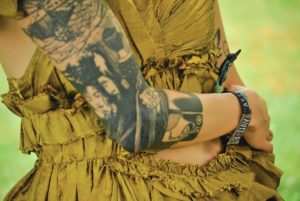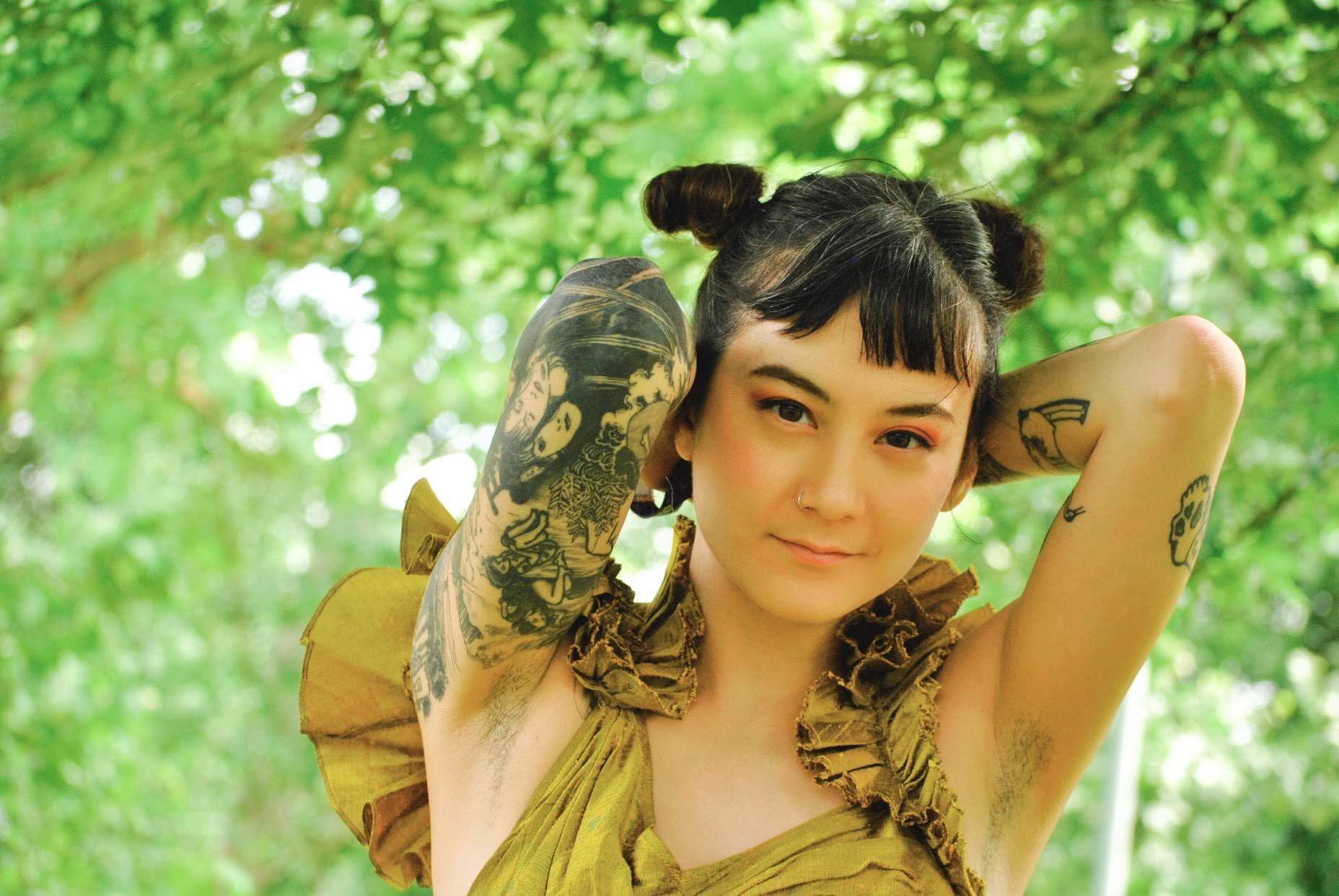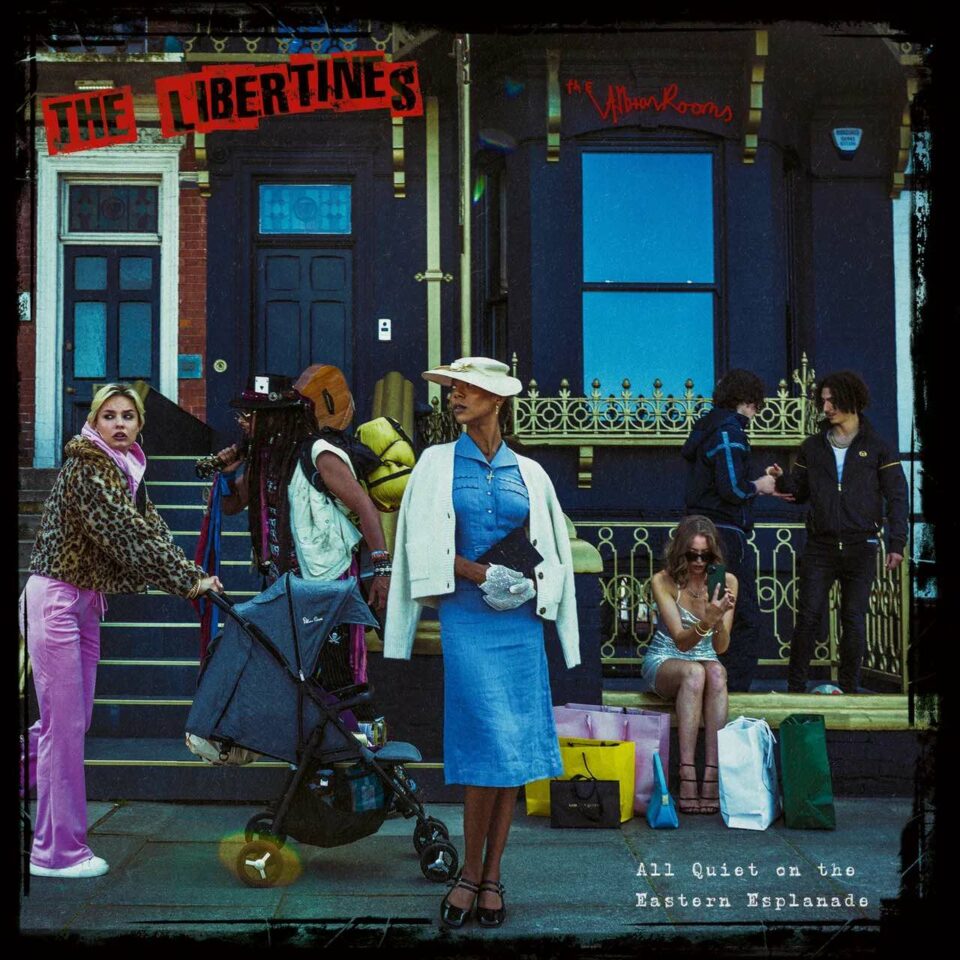Michelle Zauner released her last Japanese Breakfast album in July of 2017, but the interim has been anything but a hiatus. In August of 2018, Zauner penned an essay under her birth name for The New Yorker titled, “Crying in H Mart.” It was a staggering meditation on grief, death, and culture—so powerful, in fact, that she landed a book deal with Knopf. So in between Japanese Breakfast shows and recording new music at the W Hotel–sponsored Sound Suite studio in Bali (which saw the release of “Essentially”), Zauner has been taking the premise of “Crying in H Mart” and expanding it into a non-fiction book.
Like many multidisciplinary artists, Zauner is wary of mixing her music with her book. After finishing a six-month period in which she focused intensely on writing, she recently switched back to music. It was a change she was anticipating, until it arrived. “The last week of working on the book was all about missing music and getting back to music, and now that I’m in the thick of trying to write music, I’m like, ‘Oh gosh, have I forgotten how to do this?’” she explains over the phone. “That happens to me every time.”
Between “Essentially” and a breathtaking cover of Tears for Fears’ “Head Over Heels,” Zauner hasn’t missed a beat. With a new album on the horizon, the Japanese Breakfast project is as popular as it’s ever been. In our era, two and a half years between albums feels like an eternity; but lucky for us, Michelle Zauner hasn’t left.
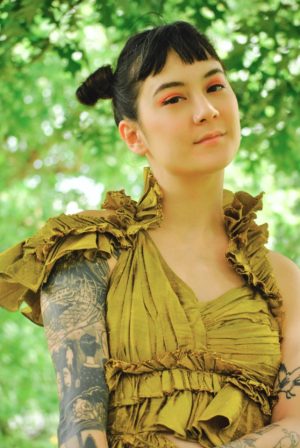 Can you talk about “Essentially” and how you ended up recording the track in Bali?
Can you talk about “Essentially” and how you ended up recording the track in Bali?
Working in Bali was obviously very nice [laughs]. I’d previously, unluckily, only recorded in the dead of winter, usually on the East Coast in a warehouse with not-great insulation. So it was very luxurious to record out there. The W Hotel reached out to us and very graciously put us up for a little less than a week.
I was originally gonna bring in a more complete demo, but their studios are geared a bit more toward electronic bands. I came with a bunch of samples and Soundpatch libraries. I was up the night before working in my hotel room, and came up with a synth line or beat. I decided to make a new song while we were there, something more upbeat and electronic heavy. Me and my co-producer, Craig Hendrix, worked on that for two or three days. It was written and recorded there.
Did recording Soft Sounds from Another Planet in the dead of winter play a role in the way that album sounded?
Maybe I sound a little cold [laughs]. I’m not sure. There are so many other factors that can dictate it too, like where I’m at in my life and where my skill set is at.
“I’m not sure how much I believed this was gonna be a reality. I always thought I’d do something with storytelling or writing, but if you told me I’d be publishing a book with Knopf, I don’t know if I would have believed you.”
Is “Essentially” foreshadowing anything to come, or is it more of a one-off?
I’m trying to work on a record now. Every time I think I have an idea of a direction things are going in, I really fuck myself over [laughs]. I get stunted trying to make that thing. I was really happy by the response to “Essentially.” If I had released that song off of a record, it would have been a bit more nerve-wracking because it sounds quite different, I think. It’s a more poppy and electronic direction. I definitely want to work with more electronic sounds and samples, though. Hopefully after two really sad records I can come up with something more upbeat [laughs].
Did releasing the song without the press cycle of a new record take the pressure off from its reception?
For sure. I hadn’t written new material in quite some time, so it was nice to get the dust off with this song. It’s nice to know I can still make a little jammer.
You’ve been playing Soft Sounds live for about two years. Are you tired of it? What’s your relationship with that record like now?
It’s kind of crazy. It feels like two years went really fast. I guess Psychopomp and Soft Sounds were released within a year of each other, so I’m used to both ways. We were on tour for like three years with those two albums. It feels lucky and great. I’m obviously excited to write and work on new material, but playing music in front of people all over the world never gets old. I would never say that I’m tired of playing those songs because those songs have been very good to me. I think that they hold up, too. Some of them will still move me quite intensely. They did a good job.
 Is there a release date for your memoir yet?
Is there a release date for your memoir yet?
There’s not. The book writing process is way longer than the songwriting process, in my experience. It’s likely I’ll come out with a new record before the book even comes out. Hopefully next year, although I know we want to avoid the election. I just turned in a rough draft, though! But it’s my first book and I want it to be something special. It’s a very personal topic, so there’s a ways to go.
Did you always aspire to write a book?
I studied creative writing in college. It’s the same thing with music. Everyone wants to be a writer, in a way. To play in a band or write a book feel like quite lofty goals. It’s like, “If I get so lucky as to be able to do that, of course I’ll do that.” I’m not sure how much I believed this was gonna be a reality. I always thought I’d do something with storytelling or writing, but if you told me I’d be publishing a book with Knopf, I don’t know if I would have believed you.
“It’s always the weird stuff that hits you with grief. It’s not talking about it that fucks you up. It’s always like, a drive to Costco or the smell of a hat.”
How did the process go from the New Yorker story to the book deal?
I had a lot of people reach out after the New Yorker essay came out, both publishers and literary agents. My professor from college is very much a mentor to me and taught me a lot about writing. His literary agent reached out to me and I had a bit of a relationship before with her, so I was excited to work with her. In 2016, I won Glamour Magazine’s essay contest for a very similar kind of essay. I had been thinking about writing a book since then, and what Crying in H Mart became was what I hoped to be a first draft of the book, eventually.
When that came out, I had begun planning to write a book about it. Quite a few people got the sense from the piece that there was a larger story to be told there, so I worked with a literary agent after that came back to start submitting to publishers. I submitted one proposal and it went to auction.
With an essay or book that hones in on grief, how hard is it to live in that experience for years after the fact? Is it difficult to discuss in interviews?
I’ve gotten to a point with interviews where I know it’s gonna come up and I have my scripts to talk about it, but I’ve also always been an open book about it. It’s always the weird stuff that hits you with grief. It’s not talking about it that fucks you up. It’s always like, a drive to Costco or the smell of a hat. With writing the book, a lot of the work was diving into memories I hadn’t thought about in a long time, and confronting things that were really, really challenging. It was definitely a difficult process, a lot of sobbing in front of a computer and getting very worked up. It was a real trial and it’s something I’m still navigating. I’m trying to find a more poetic and objective way to display that information. It’s been quite a challenge to write a book about it.
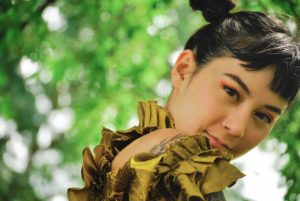 Is there any concern that people may approach your writing career as “Japanese Breakfast wrote a book”? As if it’s a side project of sorts?
Is there any concern that people may approach your writing career as “Japanese Breakfast wrote a book”? As if it’s a side project of sorts?
I have a feeling that a lot of people who find the book will be a new audience. A lot of my fans that do read the book will know—I’ve been so vocal about this project, my identity, my relationship with my mother, and my grief. A lot of people who listen to my music have also read that essay, so I think people will know going in what the deal is. It’s definitely not like, a fun book. There are moments that are sweet and fun but it does get quite dark. I think that people probably know that about me. My music is like that, too.
Do you want to consciously take your music into a lighter or less sad direction?
If I had a magic wand and was able to make a fun album, I would. I feel like every time I go into a record with a lot of intention I really struggle, and I find that it’s best to write what I know. I have tried to write happier songs, but they never quite turn out that way. I’m not sure what will happen, but I will say that I’m trying to depart from writing about grief. The first two albums were so centered around it, as is this book, and I’m kind of ready to tackle a new topic even though it’s still something very present in my life.
“If I had a magic wand and was able to make a fun album, I would … I have tried to write happier songs, but they never quite turn out that way.”
I love your Tears for Fears cover. How did that come about? I know they headlined at Shaky Knees the night before y’all played.
I actually didn’t see them. We weren’t there yet. But I got to meet Curt Smith and he’s a very nice guy. He said he heard the cover and it was very nice [laughs]. I really love that song. It’s a bop. For some New Year’s shows that the band played at Johnny Brenda’s, each band member picked a song to cover. “Head Over Heels” was my pick. I just love that song, it’s so fun and underrated. The lyrics are so wacky and weird. The production is amazing, too.
We did a full band version of the song, and it was really fun. As a band, we’ve traditionally either wildly re-created it or gotten it as close to the original as possible. It feels like a cop-out to do a stripped down, chill cover of a song. But because we had limited time at the W studio, I wanted to just use the great sounds of the Rhodes and slow it down. It’s such an upbeat song, so it was really fun to slow down and approach it in a different way.
How deep into the album are you now?
Like, fledgling stages.
Is it exciting? Are you nervous to return to this process again?
I’m both excited and also very nervous. There’s a really conscious part of me that shuts off the songwriting part of my brain and goes into hibernation when touring or working on other projects. The past six months have been big time book writing time, and I’ve really had to shut out any urges to try and write music. I need to focus on the project at hand.
Every time I try to sit down and write a song and it doesn’t happen in the first twenty minutes, I think I’ve forgotten how and it’s gone. So I’m in that stage now, where I try to re-learn how to write songs again and not beat myself up. FL
